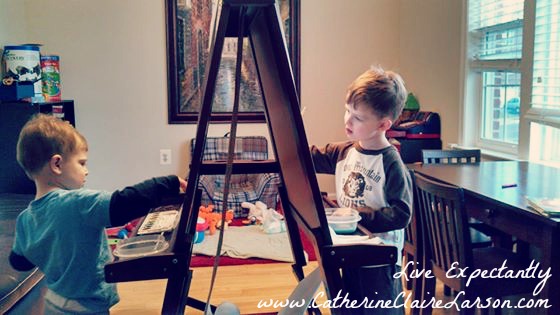Mom Fail: Turning Our Worst Moments into Teachable Ones
The other day I lost it with my child. I lost it over a turkey and cheese sandwich my four year-old was resolutely refusing to eat. Yes, you read that right: I lost it over a turkey and cheese sandwich. He was hungry; I was angry. Both of us were firmly sticking to our guns (like mother, like son—stubborn is as stubborn does). I felt justified. After all, it wasn’t like I was asking him to eat pickled herring or creamed brussel sprouts on toast. This was a simple and standard lunch, enjoyed easily enough by children all across America. Why could he not put an end to both of our miseries and eat the blasted sandwich! For the record, I didn’t curse, but I did huff and puff and blow a few cabinet doors closed as I glared at him across the kitchen. He cried. I felt horrible. In the end, he went to bed at naptime with sandwich still untouched. I was left with a plate piled high with frustration and a heaping side of guilt.
It took me longer than it should have, but later I pulled him aside and apologized. I asked his forgiveness and he freely offered it. He sealed the solemn moment with a kiss, a tender mercy I didn’t deserve, an unexpected grace to a faltering parent.
Friend, it’s hard for me to be this vulnerable with you. But I want you to know that sometimes I fail my children miserably. And I want you to know this because I know you do too. All of us do. And the more honest we can be with our own shortcomings, the better we will be able to lead our children. Here’s why: Our children need leaders who can sympathize with them in their weakness. Our children need leaders who can call their own selfishness, pettiness, discontentment, control-freakishness, and pride by name and who more than that are willing to wage war with it just like we are asking them to do.
Do we look from on high commanding our children to share, return good for evil, consider the needs of others, not complain or argue and yet not admit to them that we struggle to do right in all these areas as well? Which of these would inspire you to follow: “For the last time, Noah, share the crayons with your brother! Can’t you do anything I ask you to do?” Or if a mother took you aside and in confidence said, “Noah, I know it’s hard to let your brother have some of your favorite crayons. Even though God gives me plenty, I often don’t act like what I have is enough either. But when I give to others and see the joy it gives them, it makes me realize that doing the hard thing is worth it.” The mother might even offer to pray with him and ask God to help him choose the hard, but right thing.
Let’s take it for granted that neither of these comments may elicit the desired result (after all, our children are born with free and vibrant wills of their own; they are not robots that we can control with the right words). But even so, which of these conversations is more likely to plant a seed which will grow into a tree of generosity? Which is more likely to help the child realize that you are on his side—an ally in the common battle of becoming better than our own selfishness? Which suggests that you respect him, sympathize with his weakness, and believe that with God’s help he has the power to leave the world better than he found it?
A good leader does more than police the boundaries. A good leader inspires her followers by continually planting ideas of greatness as she walks among them. Ideas lead them. “Oh, isn’t it wonderful to see the smile on your brother’s face when you let him have the first turn.” Or what about: “I like the way you are speaking so kindly. Did you notice how your sister is following your example too? Isn’t it amazing how we can encourage one another!” Aggressive authority bruises bent reeds. It snuffs out smoldering wicks. It leads the already dejected to further despair. Those who follow the example of the gentle Shepherd lovingly fence the boundaries, inspire the stumbling to press on to the heights, and carry the weak in their arms.
I’m not always that good shepherd, but I know the One who is. If even in my weakness, I can point my lambs to Him, the perfect shepherd, the One who purely wants their best, the One who tenderly leads them, the One who does not let them lack for any good thing, then I am leading them well. All of us will fail our children. The question is will we use those failures to model repentance, will we use those failures to show them the One who leads and loves them better than even we can?
Did you appreciate this post? Don’t miss out on the encouragement. Subscribe to have these posts delivered directly to your inbox. Still want more? Check out my books on Amazon.







